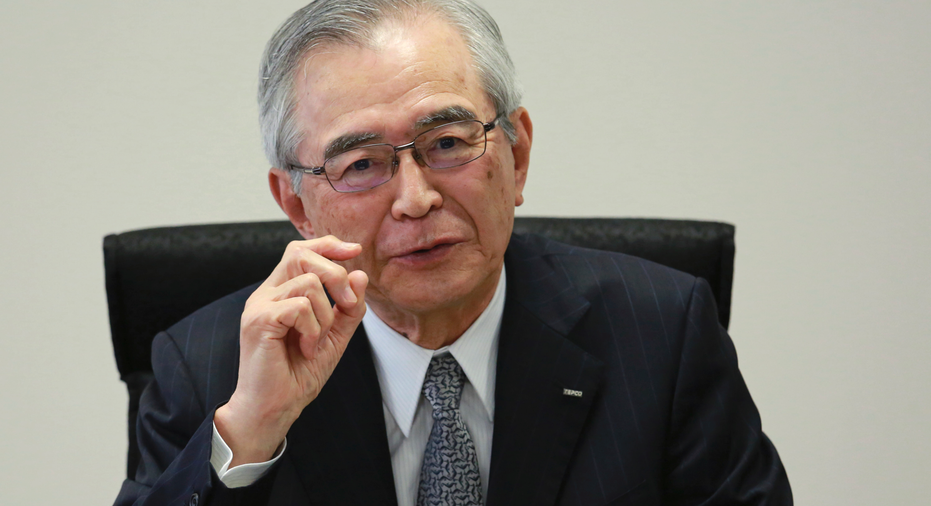TEPCO chair: Nuclear plant must release contaminated water

TOKYO – The new chairman of Tokyo Electric Power Co. says the utility needs to stop dragging its feet on plans to dump massive amounts of treated but contaminated water into the sea and to make more money if it's ever going to succeed in cleaning up the mess left by meltdowns more than six years ago at the tsunami-hit Fukushima nuclear power plant.
Takashi Kawamura, an engineer-turned-business leader who previously headed Hitachi's transformation into a global conglomerate, is in charge of reviving TEPCO and leading the cleanup at the Fukushima Dai-Ichi plant. In an interview Thursday with selected media including The Associated Press, Kawamura said despite the massive costs of the cleanup and meeting tighter safety requirements, nuclear power is still vital for Japan's national security.
Below are highlights from the interview, where Kawamura spoke in Japanese:
___
CLEANUP REQUIRES RELEASE OF TREATED CONTAMINATED WATER:
Massive amounts of radiation-contaminated water that has been processed and stored in hundreds of tanks at the plant are hindering decommissioning work and pose a safety risk in case another massive quake or tsunami strikes. TEPCO needs to release the water — which contains radioactive tritium that is not removable but considered not harmful in small amounts — into the Pacific Ocean, Kawamura said. The method is favored by experts at the International Atomic Energy Agency and Japan's Nuclear Regulation Authority as the only realistic option. Earlier, TEPCO had balked at calls by NRA chairman Shunichi Tanaka for controlled release of the water, now exceeding 770,000 metric tons, into the sea, fearing a public backlash. "Technically, we fully support the chairman's proposal," he said, adding that there is still strong resistance from local residents, especially fishermen. "I think we should have acted sooner. ... We should start moving faster."
PROFITS NEEDED TO COVER CRUSHING COSTS:
Kawamura says TEPCO must become more profitable to manage to cover the gargantuan costs of cleaning up Fukushima Dai-Ichi after it suffered multiple meltdowns due to the massive March 11, 2011, earthquake and tsunami. TEPCO'S longtime status as a regional monopoly undermined its profit-making incentive, hobbling its ability to cover most of the 21.5 trillion yen (about $190 billion) price tag for decommissioning the plant and compensating dislocated residents. "To reconstruct Fukushima, we must make more profit, and I know we should not be taking about just money, but I think that is important," he said.
DECOMMISSIONING IS THE FUTURE:
TEPCO's main mission now is decommissioning Fukushima Dai-Ichi, an unprecedented challenge that experts say could take decades and will take still more research and development. "That's our main activity and gaining new expertise in the decommissioning is far more important. But I believe there will be a time when decommissioning becomes an important business," Kawamura said. "Decommissioning is a process which takes time, not only for accident-hit reactors but ordinary retired reactors," he said. "I plan to coordinate with those who are studying the possibility of properly turning decommissioning of ordinary reactors into a viable business."
JAPAN NEEDS NUCLEAR POWER:
Kawamura says he believes nuclear power is still a viable business and one that will continue to be vital for Japan's energy security, despite the extra costs from stricter post-Fukushima safety requirements and the cost of processing spent fuel and waste. TEPCO is reviewing its business strategy, but based on rough estimates, "I still believe that nuclear is still superior for Japan, which is really a resource- poor country," he said. "Even if we take severe accident measures and factor in spent fuel processing and other costs, I think there are some reactors that can still be profitable." He said nuclear power includes a wide range of technologies that Japan should not abandon, for national security reasons, as China continues to build nuclear plants.
TEPCO'S OTHER REACTORS:
Kawamura said TEPCO hopes to restart the utility's Kashiwazaki-Kariwa nuclear plant in northern Japan, even while the decommissioning at Fukushima Dai-Ichi is underway, so the operable plant can be a major source of revenue for the company. He said a decision on whether to resume operation of the Fukushima Dai-Ni plant, near Fukushima Dai-Ichi, will depend on a financial review. He said he regrets TEPCO's slowness in making a decision and acknowledged calls from local authorities and residents to decommission the second Fukushima plant, which was also hit by the tsunami but avoided a meltdown.
___
Follow Mari Yamaguchi on Twitter at twitter.com/mariyamaguchi
Her work can be found at https://www.apnews.com/search/mari%20yamaguchi



















